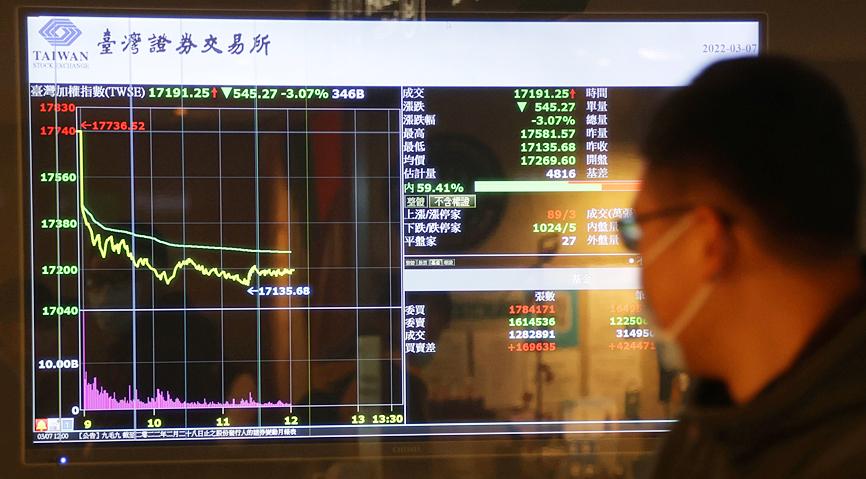The TAIEX yesterday fell by more than 400 points after US markets posted heavy losses at the end of last week amid increasing concern over the US Federal Reserve’s rate hike cycle, dealers said.
Led by contract chipmaker Taiwan Semiconductor Manufacturing Co (TSMC, 台積電), the bellwether electronics sector experienced sell-offs during the day, as rising interest rates have made tech stocks at home and abroad less attractive, the dealers said, adding that old economy stocks, especially the transportation sector, also came under selling pressure.
The TAIEX closed down 404.19 points, or 2.37 percent, at 16,620.90. Turnover totaled NT$301.695 billion (US$10.27 billion), with foreign institutional investors selling a net NT$42.20 billion of shares on the main board, Taiwan Stock Exchange data showed.

Photo: CNA
The weak purchasing sentiment on the local exchange was seen across the board, with the TAIEX closing at its lowest level since Oct. 14 last year, when it closed at 16,387.28.
During a speech to an IMF panel on Thursday, US Federal Reserve Chairman Jerome Powell said that keeping inflation under control was “absolutely essential,” adding that an increase of 50 basis points is “on the table” for the Fed’s meeting next month.
After a hike of 25 basis points last month, an increasing number of investors anticipate that the Fed is likely to raise interest rates by 50 basis points at its policymaking meeting next month, as well as in June and July, and by 25 basis points at each of its September, November and December meetings, Concord Securities Co (康和證券) analyst Kerry Huang (黃志祺) said.
“The Fed is expected to tighten its monetary policy aggressively to tame inflation,” Huang said. “Moreover, the US central bank will cut its balance sheet by disposing of bonds to take back more funds from the market, which will further deplete liquidity, the last thing that the equity market wants to have.”
Concern over rising interest rates led to a sell-off of tech stocks throughout the session, pushing down the electronics sector by 2.43 percent, with the semiconductor subindex falling 2.33 percent after TSMC fell 1.97 percent, or almost 100 points, to close at NT$547, Huang said.
“TSMC, again, led the downturn, falling below NT$550. If volatility continues among tech stocks on the US markets, TSMC shares could test their nearest support level of about NT$518 in the near term,” Huang said.
“Market sentiment has become fragile,” Huang said. “Old economy and financial stocks could not isolate themselves today from the sell-off.”
The transportation sector came under heavier pressure, falling 3.94 percent, although several major shipping stocks have announced attractive cash dividends, while the financial sector closed down 1.37 percent.
“Investors need to closely watch whether regional currencies, including the New Taiwan dollar, will stabilize or if foreign institutional investors continue to cut their holdings in Taiwan,” Huang added.

Taiwanese suppliers to Taiwan Semiconductor Manufacturing Co. (TSMC, 台積電) are expected to follow the contract chipmaker’s step to invest in the US, but their relocation may be seven to eight years away, Minister of Economic Affairs J.W. Kuo (郭智輝) said yesterday. When asked by opposition Chinese Nationalist Party (KMT) Legislator Niu Hsu-ting (牛煦庭) in the legislature about growing concerns that TSMC’s huge investments in the US will prompt its suppliers to follow suit, Kuo said based on the chipmaker’s current limited production volume, it is unlikely to lead its supply chain to go there for now. “Unless TSMC completes its planned six

Intel Corp has named Tasha Chuang (莊蓓瑜) to lead Intel Taiwan in a bid to reinforce relations between the company and its Taiwanese partners. The appointment of Chuang as general manager for Intel Taiwan takes effect on Thursday, the firm said in a statement yesterday. Chuang is to lead her team in Taiwan to pursue product development and sales growth in an effort to reinforce the company’s ties with its partners and clients, Intel said. Chuang was previously in charge of managing Intel’s ties with leading Taiwanese PC brand Asustek Computer Inc (華碩), which included helping Asustek strengthen its global businesses, the company

Power supply and electronic components maker Delta Electronics Inc (台達電) yesterday said second-quarter revenue is expected to surpass the first quarter, which rose 30 percent year-on-year to NT$118.92 billion (US$3.71 billion). Revenue this quarter is likely to grow, as US clients have front-loaded orders ahead of US President Donald Trump’s planned tariffs on Taiwanese goods, Delta chairman Ping Cheng (鄭平) said at an earnings conference in Taipei, referring to the 90-day pause in tariff implementation Trump announced on April 9. While situations in the third and fourth quarters remain unclear, “We will not halt our long-term deployments and do not plan to

The New Taiwan dollar and Taiwanese stocks surged on signs that trade tensions between the world’s top two economies might start easing and as US tech earnings boosted the outlook of the nation’s semiconductor exports. The NT dollar strengthened as much as 3.8 percent versus the US dollar to 30.815, the biggest intraday gain since January 2011, closing at NT$31.064. The benchmark TAIEX jumped 2.73 percent to outperform the region’s equity gauges. Outlook for global trade improved after China said it is assessing possible trade talks with the US, providing a boost for the nation’s currency and shares. As the NT dollar